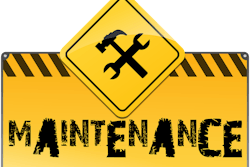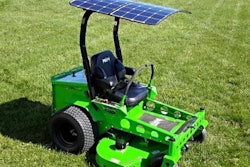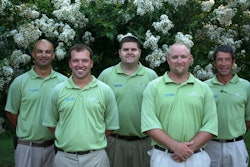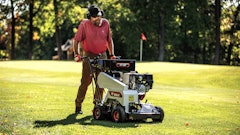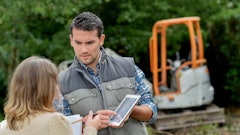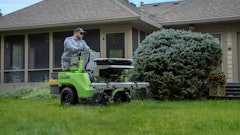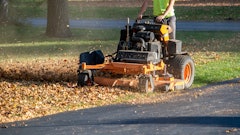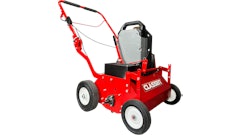When it comes to your landscape maintenance operations, going green is not just about using alternative fuels and equipment. It’s not just about practicing IPM, and it’s not just about converting properties over to water-saving irrigation systems and native plants. It’s about the entire picture—making sustainable maintenance affordable for your customers and profitable for your business.
Educate Customers on Cost Savings, Carbon Footprint
In Austin, TX, Greater Texas Landscapes is part of a team to help maintain a Sustainable Sites Initiative (SITES) pilot project at National Instruments’ corporate headquarters. Except for the building footprint, walks, drives and parking area, most of the landscape has been preserved in its natural state.
A Greater Texas Landscapes crew maintains the site using alternative-fuel equipment, applying organic and bio-solid fertilizers, and controlling pests following Integrated Pest Management (IPM) guidelines. “This property is unusual because it was designed with sustainability in mind from the beginning,” explains company president Deborah Cole. “Most of our properties are not like this, and part of our charge is to educate customers about the benefits of reducing their carbon footprint.”
Cole’s company offers a Sustainability Community Program designed to educate homeowner associations about the value of having a more sustainable landscape, with updated irrigation systems and plants that require less water, along with other renovations. “We give them a new twist on Xeriscaping,” adds Cole. “We also talk about some of the new technologies our crews use to be more environmentally friendly.”
The company’s education efforts don’t stop at the adult level, either. Cole and members of her staff work with area elementary schools, helping prepare and present lessons designed to get the sustainable message to young students.
This summer, Oregon-based Pacific Landscape Management, hosted its second annual Sustainability Fair designed to pique interest among current customers and prospects. Attendees had a chance to talk with irrigation suppliers, equipment dealers, bark and soil suppliers, solar vendors and several volunteer groups. Company president Bob Grover highlighted several examples of sustainable projects as well, including rain gardens, bio-swales, green walls and an eco-lawn.
“The economy is challenging for those of us in commercial maintenance,” says Grover. “Customers may want to incorporate sustainable principles into their landscapes, but budgets are just not there. Still, we see an opportunity to save them money by using weather-based irrigation that reduces water consumption, and ecological lawn mixtures that reduce fertilizing and mowing frequencies.”
Even if there is little or no immediate return on investment, educating customers now helps shape the discussion about what landscapes are supposed to look like in the future. “When the economy turns around, I fully expect that there will be redesigning, retrofitting and renovation opportunities,” Grover adds.
Kurt Bland, vice president of Bland Landscaping in Apex, NC, has been offering customers sustainable solutions for several years. His company’s efforts were recently validated in two distinct ways. Last year, Bland Landscaping received Green Plus Certification from the Institute for Sustainable Development. This certification, available in 17 states, recognizes companies that excel in triple bottom line sustainability: conducting a financially sustainable operation, having a positive environmental impact, and fully engaging its employees and stakeholders in its success.
In May, Bland Landscaping also received a state Department of Transportation award for operating a sustainable fleet. “The certification and award has helped us promote our sustainable services,” says Bland. “Some of our customers, including two very large commercial clients, are very interested in conserving natural resources. On the other hand, landscape management companies have to weigh their sustainable initiatives against current economic realities. Frankly, for some customers, it just comes down to price and not what is good for the environment.”
Like Grover, Bland isn’t discouraged. He believes in the efficacy of sustainability and is encouraged by those customers who reach out for environmentally friendly solutions. In fact, he recently enrolled in a graduate course on perma culture with the intent of learning more about edible and low-impact landscapes, in addition to new technologies that maximize water conservation.
Making Your Own Company Sustainable
Each of Greater Texas Landscapes’ managers holds Green Garden Certification from the City of Austin, which required four-hour classes once a week for eight weeks. Classes focused on green design, installation and maintenance techniques.
In the Portland suburb of Hillsboro, Pacific Landscape Management was one of the first area companies to receive EcoLogical Business Certification from the City of Portland. The company also has its Master Recycler certification from Portland. Its facility is certified Salmon Safe, meaning it has a water management program to reduce storm water runoff and non-point source pollution.
Both companies have re-engineered the way they provide maintenance services. Cole’s company, for example, fuels its tractors and a few of its truck with bio-diesel. Propane-powered zero-turn mowers allow crews to work on ozone-action days. For the City of Austin, that requires the use of alternative-fuel equipment. Back up in Portland, Grover’s managers drive to accounts with hybrid vehicles while crew members use low-emission and low-noise handheld equipment. “We’re always fine-tuning our routing to ensure that crews travel to and from jobsites efficiently,” Grover adds.
Among initiatives to lessen its environmental impact, Bland Landscaping uses synthetic mix oil, donates reclaimed pine straw, cleans equipment in a wash bay, uses B20 bio-diesel in trucks and some equipment, and operates low-emission handheld equipment. The company also recycles just about everything, including green wastes, scrap metal, paper products, waste oil and other lubricants.
As Bland points out, using 100:1 ratio synthetic oil instead of 50:1 petroleum-based mix oil means that equipment uses less oil and generates less waste. The company’s wash bay diverts waste water into the sanitary sewer system instead of sending it into the storm sewer system.
Sustainable ideas are abound, says PLANET president David Snodgrass, noting that many of them take shape just by changing your mindset.
His company, Dennis’ Seven Dees in Portland, OR, took a sustainable step that wasn’t necessarily easy, but has paid dividends. “We have a full blown recycling center,” Snodgrass explains. “Crews sort debris right at the jobsite. They load it into different containers on their trucks. Then they unload into separate bins at our facility.”
The company separates wood, metals, concrete/stone and green waste, among other material. Green waste is recycled and turned into compost for use as a soil amendment on projects. Any surplus is sold to area vendors. Other material goes to recycling facilities at little or no charge.
“When you consider dumpster fees and the time, labor and miles associated with going to landfills, it used to cost us about $120,000 annually to get rid of our debris,” Snodgrass relates. “Now recycling brings in between $40,000 to $50,000 annually.”
Economic Payback
Unfortunately, not all sustainable practices have the ROI that recycling does. Cole, for example, mentions that using bio-diesel is more costly than using gas or diesel, and that propane mowers are more expensive than their traditionally fueled counterparts (although she points out that there have been rebates in the past for using alternative-fuel equipment).
More expensive or not, Cole uses alternative-fueled equipment to be green—and for the ability to work for customers who require it.
Grover sees the relationship between sustainability and economics as a tradeoff. “Contractors must make a profit to stay in business, yet some of the programs we’re advising customers to do, such as taking advantage of ecological lawns, will reduce chemical and mowing frequency. Ultimately, we may not make as much on maintenance services, but will get some of it back with renovation and providing other services.”
Mark Fockele agrees. His company, The Fockele Garden Company in Gainesville, GA, teamed up as a volunteer on another SITES Pilot project, also located in Gainesville. The project, Smartville Gardens, features interpretive exhibits that demonstrate sustainability goals, including harvesting rainwater and replacing turf with drought-tolerant plants.
“The project is very easy to maintain,” says Fockele. “About 90% of the turf was eliminated, which reduces mowing and saves on fuel costs. The use of drought-tolerant plants in combination with harvesting rainwater has allowed the project to thrive for the last two years with no municipal water whatsoever. Even the harvested water has not been needed until the end of July this year. Installing plants that require minimal pruning further reduces a maintenance presence. Of course, there will always be pruning to do in order to shape the plants, but that’s the fun kind of pruning.”
In Fockele’s words, the project is fun and interesting with minimal maintenance. When asked about the long-term impact of similar sustainable solutions for his company’s landscape maintenance division, he replies, “There’s plenty of turf to keep us busy.” As Fockele notes, not all properties are conducive to low-maintenance solutions and not all customers are receptive.
But more are, and more will. Re-engineering your maintenance offering toward a more sustainable approach makes both environmental and economic sense.





